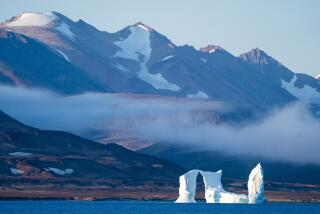Study Suggests Ice Age Ended Over Decades, Not Eons
- Share via
WASHINGTON — An ice age that gripped the Earth for thousands of years ended abruptly when temperatures soared, according to new findings that suggest the world’s climate can change in just a few decades.
The study prompts fresh concerns that climate change from global warming could happen suddenly, experts say.
Jeffrey P. Severinghaus of the Scripps Institution of Oceanography said a new method of analyzing gases trapped in Greenland ice shows that the air temperatures warmed rapidly at the end of the last ice age about 15,000 years ago.
“There was a 16-degree abrupt warming at the end of the last ice age,” said Severinghaus, lead author of a study to be published Friday in the journal Science. “It happened within just a couple of decades. The old idea was that the temperature would change over a thousand years. But we found it was much faster.”
Severinghaus said the rapid temperature increase may have been initiated by a surge in warm currents in the Atlantic Ocean that brought a melting trend to the vast ice sheet covering the Northern Hemisphere.
It still took hundreds of years for the ice to recede, but the start of the great thaw was much more sudden than scientists once thought.
This suggests, Severinghaus said, that the Earth’s climate is “tippy” -- prone to be stable for long periods, but subject to sudden change under the right conditions.
“We know that over the next 100 years the Earth will probably warm because of the greenhouse effect and there is a remote possibility that we might trigger one of these abrupt climate changes,” he said. “This certainly gives us pause.”
Severinghaus said the study is based on a new technique that analyzes the isotopic chemistry of argon and nitrogen in the ice cores and allows the detection of temperature change with an unprecedented precision.
Jim White, an expert in climate history at the University of Colorado, said the work of Severinghaus and his co-authors “is really a bold new step in what we can reconstruct about the environment using ice cores.” White said earlier research suggested that “these abrupt kind of changes in the climate are certainly possible,” but the new study gives a more precise measurement.
Pieter P. Tans, a scientist at the National Oceanographic and Atmospheric Administration, said that “both the rapidity and the magnitude of the temperature change is surprising.”
But scientific caution demands “another piece of evidence to support it,” he said.
Climate is thought to be a complex mix of air and sea temperature, ocean currents, atmospheric chemistry, ice sheets, land masses, and even the position of the Earth in its orbit of the sun. Just how they work together to create global climate is still not completely understood.
Many experts have predicted that an increase in greenhouse gases, such as carbon dioxide, could cause a gradual global warming, with temperatures rising slowly over many decades.
But Severinghaus said the Greenland ice core study suggests that such changes in the Earth’s climate may not be smooth, but sudden. He said there may be “thresholds of change” that are still unknown or not understood.
“We can’t really say how much carbon dioxide (a greenhouse gas) is okay or not okay,” he said. “We might do well to expect surprises.”
The greenhouse effect is global warming caused by the buildup in the atmosphere of manmade carbon dioxide and other gases that trap the sun’s heat.
A steady rise in carbon dioxide that has been detected since 1850 is thought to be from increased burning of fossil fuels, such as gasoline and coal. There has also been an increase in methane, another greenhouse gas, that is linked to the industrial age.






